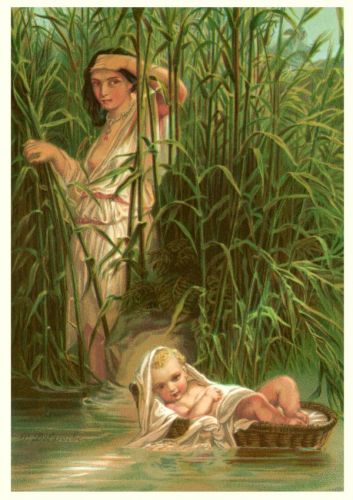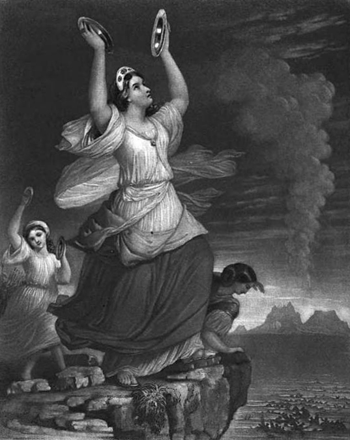One of the things that struck me in
the Book of Exodus was the title of “prophet” being bestowed on a woman. In an
ancient world that is so obviously dominated by men, this kind of power and
reverence being given to a female seems strange. For my blog, I wanted to learn
more about this prophetess, Miriam, her role in Hebrew society, and how she
came by this title.
Miriam
is the older sister of Moses. After Pharaoh issued a decree that all infant Hebrew
males must be killed, Moses’ mother put Moses in a basket and cast him into the
Nile. Miriam kept watch over her little brother until Pharaoh's daughter
discovered him. When Pharaoh’s daughter takes pity on Moses and decides to
spare the child, Miriam emerges from hiding and offers to find a nurse for the
boy. The girl goes and fetches her mother, therefore allowing Moses to be
raised with some familiarity of Hebrew culture by his own mom (Exodus 2:3-10). Here,
Miriam lets readers know one thing about her for sure—the girl is certainly
clever. However, is this intelligence alone enough to earn Miriam the title of
prophetess? (1)
In
order to answer this question, it is necessary to first address what exactly it
means to be a Prophet or Prophetess. A prophet, according to the text, is a
person who God speaks to and through. Yahweh uses prophets for many different
purposes during the course of our text, but they are always used in some way to
deliver a message from God. (2) Few characters in the Old Testament are granted
this honor, and only five of them are women. Miriam is one of those select women who has
been granted the honor of being spoken to by Yahweh. (3)
As a
prophetess, the older sister of Moses, and the older sister of Aaron, another
Biblical prophet from Exodus, Miriam no doubt played an influential role in
society. Many Biblical scholars believe that Miriam was the leader of all of
the women who followed Moses out of Egypt during the Exodus. After the Hebrews
are freed from bondage in Egypt and escape across the Red Sea, Miriam leads her
people in a song of praise to Yahweh and leads the first worship the Hebrews
practice as a free people. (4)
Not
only is Miriam given extraordinary honors by Yahweh and a position of
leadership in the Hebrew culture, she is also the first woman in the Bible
whose story centers not on her ability to produce children, but rather her
intellect and leadership capacity. (5) While Miriam was eventually married to a
man named Hur, she was unmarried at the time of the Exodus, and her marriage
remains rather insignificant to the text. Other female characters in our text,
such as Rebekkah and Sarah, seem to be only concerned with how many children
they can produce. These thoughts, however, never seem to enter Miriam’s mind. She
is instead concerned with the future of her people and the worship of her God. She
is valued not as a means to produce heirs, but as a leader. For this reason,
many modern women look back on Miriam as the first female Biblical role model.
(1) http://judaism.about.com/od/holidays/a/Who-Was-Miriam-Women-in-the-Bible.htm
(5) https://www.agts.edu/faculty/faculty_publications/gill/gill%20resources/Nances_miriam.pdf


No comments:
Post a Comment